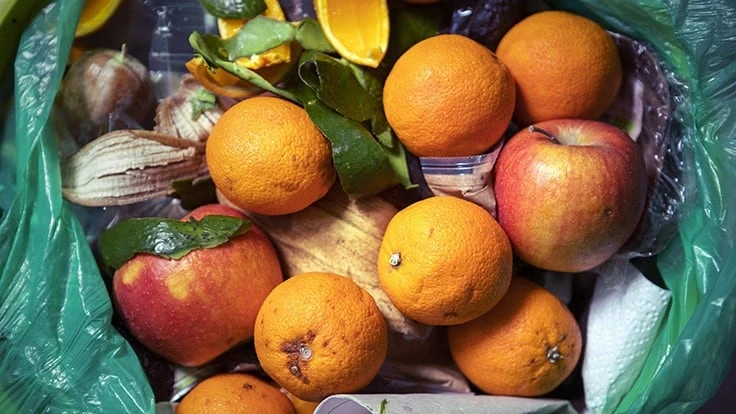
Photo from Recycling Today's photo archive
Residents and business owners in California will now be required to separate organic materials like food from recycling and trash after Senate Bill 1383 took effect Jan. 1. The bill was passed in 2016 to reduce greenhouse gas emissions from landfills and slow climate change.
The bill requires residents and businesses to recycle organics and all jurisdictions must provide organics collection services by 2024. The organic scrap that must be separated includes food scraps, landscaping waste, wood, paper products, manure and organic textiles.
Each jurisdiction can choose its own method of collection so long as it can recycle the organic waste into usable products, including compost, biofuel and paper. This includes one-, two- or three-container systems.
Penalties for noncompliance will be determined and enforced by each jurisdiction. However, the program will be rolled out slowly for homes and businesses in the coming months, with the actual start date varying depending on the location, reports the Los Angeles Times.
State officials hope to reduce organic waste disposal by 75 percent from the 2014 level by 2025 and recover 20 percent more edible food. The goal is to cut down on methane produced in landfills, which accounts for 20 percent of greenhouse gas emissions globally, according to the EPA.
Latest from Recycling Today
- BMW Group, Encory launch 'direct recycling’ of batteries
- Loom Carbon, RTI International partner to scale textile recycling technology
- Goodwill Industries of West Michigan, American Glass Mosaics partner to divert glass from landfill
- CARI forms federal advocacy partnership
- Monthly packaging papers shipments down in November
- STEEL Act aims to enhance trade enforcement to prevent dumping of steel in the US
- San Francisco schools introduce compostable lunch trays
- Aduro graduates from Shell GameChanger program





